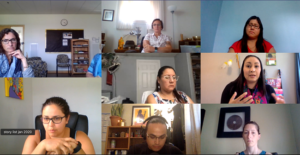Boushie family joins the City of Thunder Bay in hopes that ‘things will be different for our younger generations’

By Rick Garrick
THUNDER BAY — Thunder Bay’s nîpawistamâsowin: We Will Stand Up virtual screening and panel discussion featured the late Colten Boushie’s family members Jade Brown-Tootoosis and Mylan Tootoosis and legal counsel Eleanore Sunchild on June 25.
The City of Thunder Bay co-hosted the film screening and panel discussion along with the Thunder Bay Public Library as part of Indigenous People’s Awareness Month. Tasha Hubbard directed the award-winning documentary about Boushie’s death in a Saskatchewan farmyard and his family’s search for justice.
“I wanted to come in with strength and with some guidance as to our experience, but at the same time, I felt like I possibly was preaching to the choir in that you [in Thunder Bay] have experienced a lot of your own injustices and seen a lot of families go through the process,” Brown-Tootoosis says. “I’m just appreciative of the opportunity to be able to connect and the questions for the panel yesterday I felt were the most insightful of any panel I’ve been on — it was looking at generations from now, it was looking at how settlers can adjust and become more informed when it comes to anti-Indigenous racism.”
Brown-Tootoosis says her family has to “fight constantly” to bring humanity to Boushie, noting he was a human being who was loved and a brother, son, grandson, friend and helper in the community.
“What I want people to know is my brother was a good person and every day, we miss him,” Brown-Tootoosis says. “Every day, every family celebration, every gathering, we wish he was there and we think about him and we hold true to our traditional upbringings — we think about him during our prayers, he’s in our thoughts when we make our feast plates. We know he is there spiritually with us and always watching over us, but we can’t help but miss his physical presence constantly.”
Regina Mandamin, manager, Indigenous Relations and Inclusion with the City of Thunder Bay and Wiikwemkoong citizen, says it was important to hold the film screening and panel discussion to provide an opportunity for non-Indigenous people to learn about the culture, heritage and experiences of Indigenous people.
“Like we’ve seen in the film and our panelists Jade and Eleanore and Mylan discuss, our experiences were not that different,” Mandamin says. “We’re faced with the situation where people are finally talking about racism and anti-racism, so [what] we were hoping to achieve from this film and panel discussion is some learnings and opportunities for people to look within themselves and think of, ‘Okay, what can I do with this knowledge and information and how can I help?’”
Brown-Tootoosis says film screenings and panel discussions such as this one are the reason why her family agreed to work with Hubbard on the documentary.
“I am appreciative for Dr. Tasha Hubbard for using her gift of storytelling and her ability as a filmmaker to record what we went through, what happened to us, as well as to reflect on the big picture, as well that this is an ongoing issue, that this has happened before, looking at the past to looking at the present, and what does it mean looking forward,” Brown-Tootoosis says. “So that is why we do what we know — it’s not easy to be on a panel and to recollect our experience and to hear of other families in other communities going through the losses. But the hope is that by telling our story and connecting with people across the country and across the world that change will come about and things will be different for our younger generations.”


